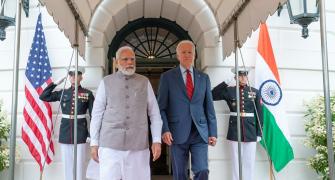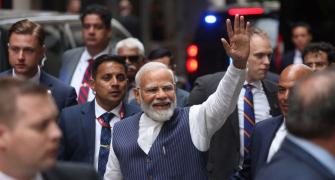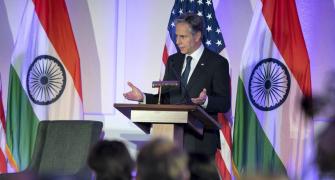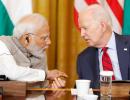'India will want a lot of help from the US, but it's not going to want US troops.'
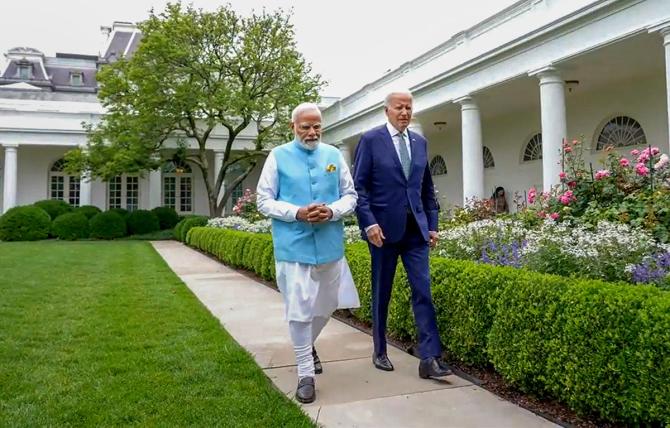
South India is Dr Marshall M Bouton's sontha oor (சொந்த ஊர்) or own/native place, he says, and he hopes to visit home again soon.
He fell in love with India after he came to our country for the first time in 1964 and met his wife Barbara there too. The adoration -- for India, and his wife, of course, too -- blossomed into the role of advocate for India and a lengthy career of working for a better friendship between the US and India, via his work in think-tanks, research papers, postings to India and so on.
Dr Bouton was the president of The Chicago Council on Global Affairs since 2001, for 12 years and president emeritus since 2013. He also served as chairman of the Pennsylvania-based Center for Advanced Study of India's International Advisory Board and remains a member; CASI is a respected US institution conducting research in South Asian studies and is known for its scholarship on India.
Agrarian Radicalism in South India, The Foreign Policy Disconnect: What Americans Want from Our Leaders but Don't Get and many editions of India Briefing are books that this Indophile wrote or coauthored.
While for many an avid India-US relationship watcher, champion, loyalist what unfolded in Washington, DC, last week should have been a moment of pure joy, Dr Bouton has mixed feelings.
"The real question remains what are each other's intentions for the relationship over the longer term? And can we build a relationship that's going to be steady and sustained through the hard times ahead?" Dr Bouton tells Rediff.com's Vaihayasi Pande Daniel.
The first of a two-part interview:
We keep speaking at intervals, post Prime Minister Modi's US trips, with respect to the US-India relationship.
It's hard to figure if things, after the euphoria of Modi's State visit with President Biden wears off, will ultimately go forward in this country-to-country relationship, will stay in the same place or can even eventually go backwards.
What is your summing up of this latest interaction and visit?
Speaking of forwards and backwards, I think the story of this Modi trip is a forwards and a backwards story.
Forwards in the sense that I think it's the image of the trip, it's the buttering up of Modi, it's the seeming acceptance, at the highest levels of the US government, of India and (more than acceptance) recognition of India as a friend.
And with that the willingness of the US to do some quite remarkable deals in the defense and security realms, most notably the GE engines. That's the forward part.
If you go back to (US National Security Advisor) Jake Sullivan's very important speech a month-and-a-half ago, he lays out the strategic framework for America's foreign policy and national security policy.
He clearly creates a space for India. Here the administration is walking into that space, almost ahead of India. So that's the forward piece.
The backward piece -- this is my personal view obviously -- is that the Modi visit, exposed and gave greater visibility to India's problems, what we see is India's problems for many (of us) here, including in the administration and in (the United States) Congress.
The democratic backsliding, the communal problems or communal antagonisms, the majoritarian approach.
And you saw that in (Barack) Obama's comment and Obama was India's best friend for eight years there.
Obama comes out and says, 'Look, good guys, what you are doing is going to bring you trouble down the road', which is what many of us have been saying for a while.
The other backward aspect or area of uncertainty -- and the visit that was marked with all that 'It's a grand new era' and 'We're the next big thing after the civil nuke deal' -- is that the reality is -- and most thoughtful observers, like Ashley Tellis (Tata Chair for Strategic Affairs, senior fellow at the Carnegie Endowment for International Peace whose specialisation, among others, are Asian strategic issues), recognise this -- is the reality, or the worry or uncertainty if the US begins to believe, it convinces itself, frankly, that India is on the road to becoming not only a really close friend, a defense and security partner, and down the road, India will have our back when there's trouble in Asia. Many of us feel very uncertain about that.
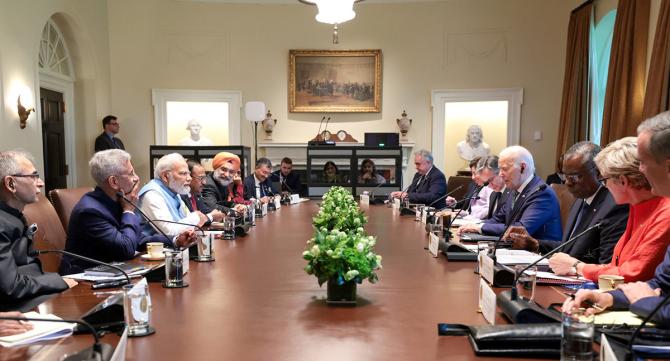
US Secretary of State Antony Blinken, US Secretary of Defense Lloyd Austin III, US Secretary of Commerce Gina Raimondo and other IS dignitaries on the US side. Photograph: ANI Photo
Yes, Dr Tellis said something about it being not a good bet.
He said it's 'a bad bet'. And poor Ashley, who has been the cheerleader not only in the government, but in the US think-tank world, on the India-US relationship for 20 plus years now, really 30, and the strategist behind the extraordinary transformations in the relationship, obviously, starting with the civilian nuke deal. He has expressed these concerns.
I think he got dealt a bad hand by the editor of Foreign Affairs , who put that particular title on it: America's bad bet and poor Ashley has been -- actually, a good friend of mine, full disclosure -- giving interviews all over the place to try to walk back the dire implications that were drawn from that article.
If you read that article clearly and carefully, it is extremely perceptive. Because what Ashley says is that, once again, we stand at the brink of convincing ourselves of having an American dream about India, the way we had an American dream about China.
Go back 30-40 years, the American dream was that we would help China engage with the world economically, diplomatically -- not so much in the security realm there -- but in those two other areas.
We would help legitimise China on the world stage. And then sure enough, the Chinese would become democrats like us.
Of course, that's not happened. We've had the yin and the yang, we've had the big swing in Washington now. As you probably know, if you say the word China, people start spitting at you.
Some of the people who gave the earliest warnings about the trend of affairs in China, under Xi Jinping, are the very same kinds of people who are who are worrying, now openly, about what's happening in India -- the media, the think-tank world, the human rights community, the press freedom community.
And India has acted with, 'We don't care about those people. We've got Joe Biden in our pocket'.
There's some truth to that, because in Washington, the hard-headed people believe that we have to have India on our side, or at least tilting towards us. It's not like how it was when US was tilting toward Pakistan anymore.
It's a little more than tilting. We're practically leaning over to India.
I'm worried about whether the two sides are really speaking openly and honestly about this with each other.
(India's foreign minister, Subrahmanyam) Jaishankar and Ashley Tellis can sit down and understand each other, and they've been doing that with each other for years. But Jaishankar is not the Indian government and, and Ashley, despite his wide influence, and the great respect he commands, is not the American government.
Do you get Milind Vaishnav's podcast Grand Tamasha and know who he is?
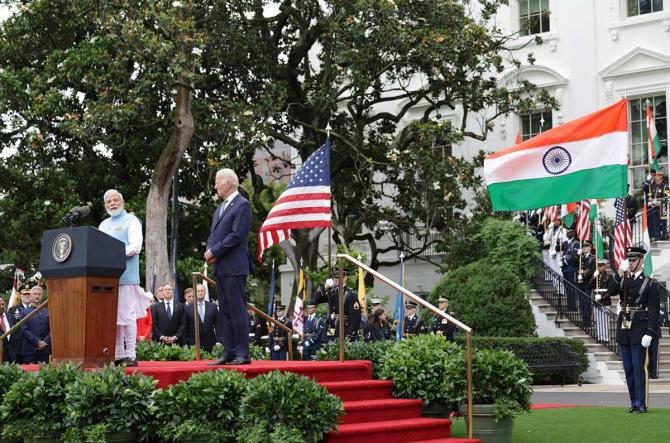
We've interviewed him many times.
His most recent podcast is an almost an hour-long interview with Ashley, in which Ashley explicates in great detail, his understanding of where the relationship is now, and the concerns he has about a turning in a wrong direction, if we harbour misconceptions about each other's behaviour.
So let me just cut to the chase here, and say two things. First of all, in terms of India-US relations, the substance of the relationship is on the security side -- mind you, not the economic side yet, far from it, the economic side has always been the weak leg of this relationship.
On the defence and security side, which for both sides is the critical aspect of the relationship, at this point in time, the visit is definitely a step forward.
On the diplomatic side, there was lots of hoopla and so forth and so on, but the real question remains what are each other's intentions for the relationship over the longer term? And can we build a relationship that's going to be steady and sustained through the hard times ahead?
You know, if there's a US-China conflict over Taiwan, and India might very understandably -- I'm not criticising India -- (say no), when the US looks to India for help for being able to land airplanes flying from the Persian Gulf, heading over to Taiwan, and wants to land them in India, on the way over, to refuel.
What will India do? Who knows? And I don't think in any given (situation), militarily, India is likely to come to the US's aid in such a scenario.
So, it is a step forward in the relationship, but it brought to the fore some of the potential problems down the road.

I was watching an interview with former National Security Advisor Shiv Shankar Menon, and he says that that through history, India and the US have not really been allies.
But now we're embarking on this very, very. ambitious relationship.
So then what are we? Are we more than allies are? How would you classify our relationship?
Security partners. Strategic partners.
Because we have certain interests in common, obviously, but most importantly, China.
More broadly, the balance of power and stability in Asia, in the 21st century.
You know for alliances, you have a treaty and you do have to have certain ironclad commitments to each other. Like the Europeans, invoking Article 5 of NATO, when we were hit by at 9/11. As far as they were concerned, they were ready to go to war for our benefit. They did help in Afghanistan.
India's not going to respond like that. We could imagine a series of contingencies.
You could say on the other hand, how would America respond if China invades India along the LAC, more than it has, if it attempts to take some territory and teach India another lesson.
India will want a lot of help from the US, but it's not going to want US troops. Right. It's not going to want visible military involvement from the US.
So, I would say we're security partners, and an increasingly substantive partnership. That's to the good. I'm not criticising. That's to the good.

Because it's more pragmatic?
Exactly. And it's not an open-ended commitment to each other.
Ukraine really didn't figure at all as an issue. Do you think that Ukraine could figure in the future, if this India-US relationship takes off further. Or maybe it's not a non-issue right now at this point?
It's not a non-issue. Of course.
No, I mean non-issue in the India-US relationship.
I think the US decided to put the Ukraine issue aside.
Feature Presentation: Aslam Hunani/Rediff.com

